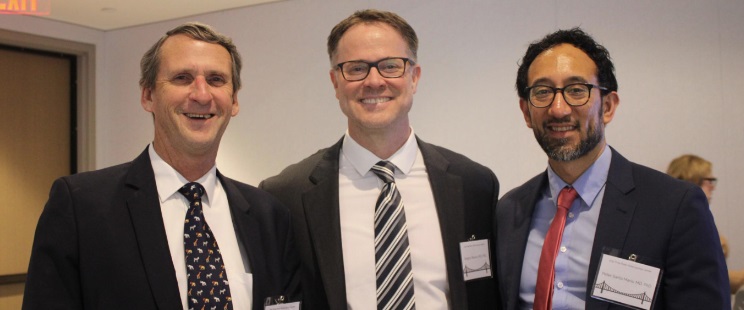S+S, Spring 2025
The Department of Otolaryngology-Head & Neck Surgery has expanded its global outreach, thanks to the addition of Dr. Gregory J. Basura, MD, PhD. His leadership in this area — in which he has worked to develop sustainable educational and clinical initiatives in underserved nations — continues with his Departmental position as Director of Global Outreach.
Dr. Basura helped launch the first otology fellowship established in Africa in 2022. He is continuing his involvement in the program, which is about to graduate its third fellow. Dr. Basura’s role is a weekly Zoom lecture for the fellow, along with twice a year in-person visits to work in the temporal bone lab with the fellow. In November 2023, Dr. Basura launched the African Otological Society, a once per month online meeting to build otology and audiology capacity in Africa.
Dr. Basura is also overseeing the International Visiting Scholars Program, started by Dr. Eugene Myers, MD, FACS, FRCS, Emeritus Distinguished Professor and Department Chairman. The global partnership program was created to provide visiting international providers an opportunity to shadow in the clinic and operating room. Some have stayed longer than the typical one-month rotation to engage in research. “I am honored to oversee this phenomenal program started by Dr. Myers, who is considered the father of global outreach in otolaryngology,” Dr. Basura said.
Other current global efforts include building long-term medical educational partnerships with Mozambique and Peru. “We have a cooperative with South Africa and Dr. Johan Fagan who trained here in Pittsburgh and completed fellowships in otology and head and neck surgery,” Dr. Basura said.
From a clinical/patient care standpoint, Dr. Basura brings a set of skills in lateral skull base surgery that are being broadened and implemented with his neurosurgical colleagues. He was also recently awarded a RO1 grant from the National Institutes of Deafness and Communications Disorders to investigate objective brain changes in human tinnitus using innovative brain imaging with functional near infrared spectroscopy (fNIRS). He is also investigating using fNIRS to study brain plasticity in patients with single-sided deafness and post-cochlear device implantation.
Dr. Basura’s labs are getting up to speed and data will be collected in the near future. “I hope to have meaningful data to share in the next few months,” he said.
